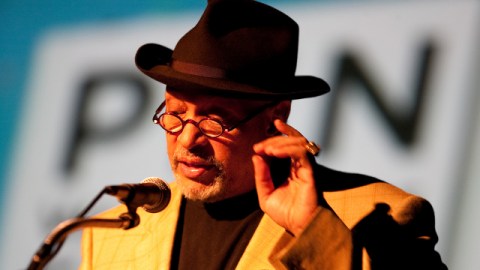Walter Mosley: The Older You Are, the More You Live in the Past

“A lot of people get upset at young people,” says Walter Mosley, “They say, ‘Young people aren’t living up to their potential. Young people are interested in things which are shallow, which are meaningless, which are unimportant. But the truth is, is that the older you are, the more you’re thinking is historical, and the more historical things become—especially in our world today, where things change so quickly because of technology, the more they’re invalid.”
This is just one of many insightful observations on work, life, and writing, that Mosley makes in his recent Big Think interview. The critically-acclaimed novelist stopped by Big Think studios to reflect on his most recent novel “The Last Days of Ptolemy Grey,” which details the life of a 91 man suffering from dementia. In light of Big Think’s Breakthroughs series on Alzheimer’s disease, it was interesting to find that Mosley was drawn to the subject of senility from taking care of his own mother. “My experience of people with dementia is that a lot of their personality, a lot of their knowledge, a lot of their experience is still there but there’s not a direction connection that they can just reach out and get it and then bring it back,” says Mosley.
Regardless of the subject matter or length of a writing project, Mosley says he sticks to the same writing schedule, writing about a thousand words each morning, sometime before most people even read the morning paper. “The next morning, I read those thousand words and cursorily edit that. Then I write the next thousand,” he says. “I do that all the way to the end of the book and then I reread the book quite a few times, editing as go through because you know, your book grows; the early part of your book is growing still while you are writing the later part of your book.”
This is the same schedule, more or less, that he’s kept since leaving his day job as a computer programmer in his 30s to pursue writing full-time. Avid readers of his work may find that his prior experience as computer programmer sometime shows in the form of “little discreet boxes of logic” his writing, says Mosley. In his opinion, making such a career shift wasn’t as dramatic as it may seem. In fact, Mosley explains that it was somewhat unintended: “When people come to me and say, ‘So when you started writing, you were trying to become a successful writer,’ and I say, ‘No, when I became a writer—I started writing, what I wanted to do was to write a short story that worked.’ And I never really thought I’d be successful. I never thought I’d get books published, but this was something completely beyond me. You know, the fact that it happened is wonderful, but it is not something that I was aiming for.”
Aspiring writers shouldn’t measure their success in dollars and cents or fame, says Mosley, but rather in their ability to entertain people with their writing. “Mark Twain, Charles Dickens, you know, Victor Hugo. I mean all of these people, they’re popular writers. They’re writing to the broadest range of people,” explains Mosley. “Yeah, it’s great literature, but it was popular literature when it was written. And that’s the case with almost all of the literature that survives starting from Homer. You know? It’s the adventure; it’s the story; it’s the fight; it’s people falling in love; it’s people with deep, you know, personality disorders who succeed anyway; you know, beyond themselves. That’s what great literature is.”





